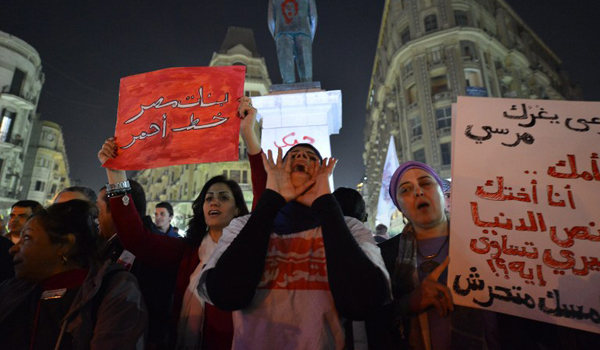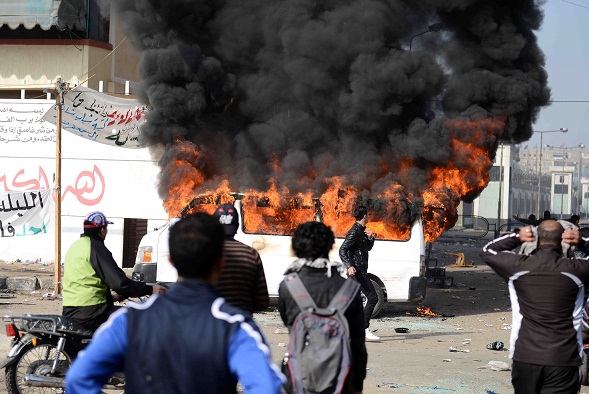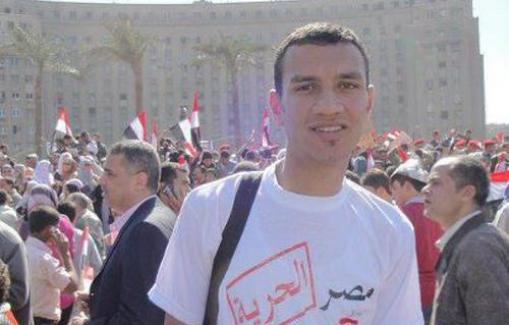
(AFP PHOTO / KHALED DESOUKI)
At least 500 Egyptians have been victims of sexual violence since February 2011 and until January 2014, a group of civil society organisations said on Monday.
Twenty-five civil society organisations condemned the latest wave of sexual assault in Tahrir Square in a joint statement released on Monday.
The organisations reported at least nine cases of sexual assault in Tahrir Square on Sunday as people flocked to the iconic square to celebrate the inauguration of former army general Abdel Fattah Al-Sisi, which took place over the course of the entire day.
Presidential Spokesman Ihab Badawi said on Tuesday that Al-Sisi stressed to resigning Interior Minister Mohamed Ibrahim the importance of firmly applying the law to combat sexual harassment. The president urged citizens to “carry out their duty in reviv[ing] the true spirit and moral values of Egyptians” to eradicate sexual harassment, reported state-run Al-Ahram.
The Ministry of Interior said on Monday that it had arrested seven men in light of sexual harassment reports. Interior ministry spokesman Hany Abdel Latif said two cases of sexual harassment, not assault, were reported to the ministry from Tahrir Square.
The prosecutor general’s office said in a statement on Monday it was investigating the cases of sexual harassment which occurred in Tahrir Square on Sunday. The public prosecution said assailants tore off the clothes of several female protesters and sexually harassed them to “ruin the celebrations”.
The prosecution said it was interrogating the victims, adding that it referred them to the Forensics Authority to document their injuries.
The prosecutor general’s office also said it was interrogating three suspects detained since Thursday for sexually assaulting a 42 year-old woman and her daughter in Tahrir Square. Demonstrators gathered in Tahrir Square on 3 June to celebrate Al-Sisi’s win, shortly after the official announcement of the presidential elections’ results. The prosecution added that the aforementioned assault was repeatedly shared on social media on Monday.
A video documenting one case of sexual assault in Tahrir Square went viral on Sunday night. The video shows a woman being subjected to mass assault after she is stripped naked, with security personnel trying to drive the assailants away. The Daily News Egypt was unable to track the time the video was taken.
In its statement, the prosecution detailed the incident of sexual assault, saying that the 42 year-old victim was stripped naked and scalded with boiled water as the assailants repeatedly touched her. The prosecution added that police forces intervened before the assailants were able to do the same with the daughter.
The three suspects are facing the charges of: forcible indecent assault, attempted rape, detention and torture, the prosecution said, adding that it is working on identifying the rest of the assailants.
The state-affiliated National Council for Women (NCW) condemned the aforementioned assault in a statement released on Monday, describing it as “barbaric”.
The newly sworn president honoured a police captain, Mustafa Thabet, for saving a sexual harassment victim in Tahrir Square, reported Al-Ahram.
The interior ministry said in a press statement that a police officer was injured while arresting sexual harassers in Tahrir Square on Sunday.
The NCW said on Tuesday it is coordinating with the interior ministry’s human rights sector to forward to the ministry all complaints the council receives regarding violence against women. The NCW added in a press release that the ministry will intensify its security presence in the streets and in crowded areas to combat sexual harassment, citing deputy interior minister for human rights affairs Hussein Fekry.
The 25 signatories of Monday’s statement stressed that combating the phenomenon of sexual harassment needs an “integrated national strategy” and a “comprehensive” legislation.
In May, Prime Minister Ibrahim Mehleb’s interim cabinet passed a draft law amending articles in the Penal Code establishing harsher punishment for sexual harassment.
Shortly before ceding power, former President Adly Mansour issued a decision on Thursday amending Article 58 in the Penal Code, to define the term “sexual harassment” as a crime and introduce harsher punishment for its practice.
The new law deals with harassment as a crime punishable by a minimum of six months in prison which could expand to five years, depending on its type. It also fines the harasser from EGP 3,000 to EGP 50,000.
The legislation expands the definition of sexual harassment, stretching it to include the use of sexual innuendos through “signs”, whether verbally or physically. The signatories of Monday’s statement criticised the aforementioned definition for linking harassment to the harasser’s intentions rather than linking it to the level of harm that befalls the victim, adding that looking into the assailant’s intentions would limit the effectiveness of the legislation’s application.
The signatories stressed the need for further expanding the definition of sexual assault as well as defining rape in a manner which would include: anal rape, oral rape and rape using sharp objects.
The signatory organisations included the Egyptian Initiative for Personal Rights, the Association for Freedom of Thought and Expression, Operation Anti-Sexual Harassment, and I Saw Harassment (Shoft Tahrosh) Initiative.
Egypt’s women’s rights organisations have long been calling for laws to address the proliferating phenomenon of sexual harassment. Sexual assault amid large political demonstrations has become a recurring incident since the mob sexual assault CBS reporter Lara Logan faced on 11 February 2011 as Egyptians were celebrating the overthrow of former President Hosni Mubarak in Tahrir Square.
During the weeklong protests which preceded the ouster of former President Mohamed Morsi on 3 July 2013, anti-harassment groups reported the occurrence of at least 101 cases of alleged sexual assault in Tahrir Square.
A report issued by the United Nations Entity for Gender Equality and the Empowerment of Women in April 2013 revealed that an overwhelming majority of Egyptian women (99.3%) have experienced some sort of sexual harassment, and 96.5% of women had been sexually assaulted.

